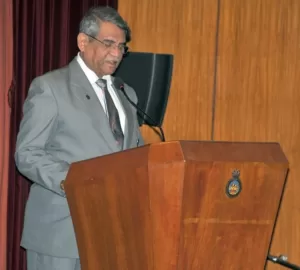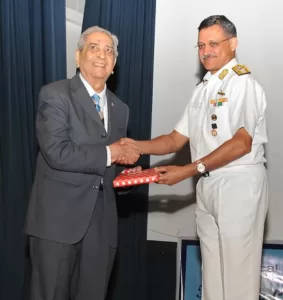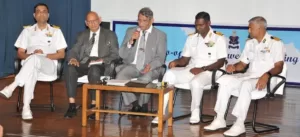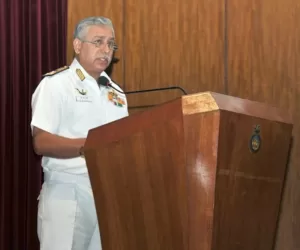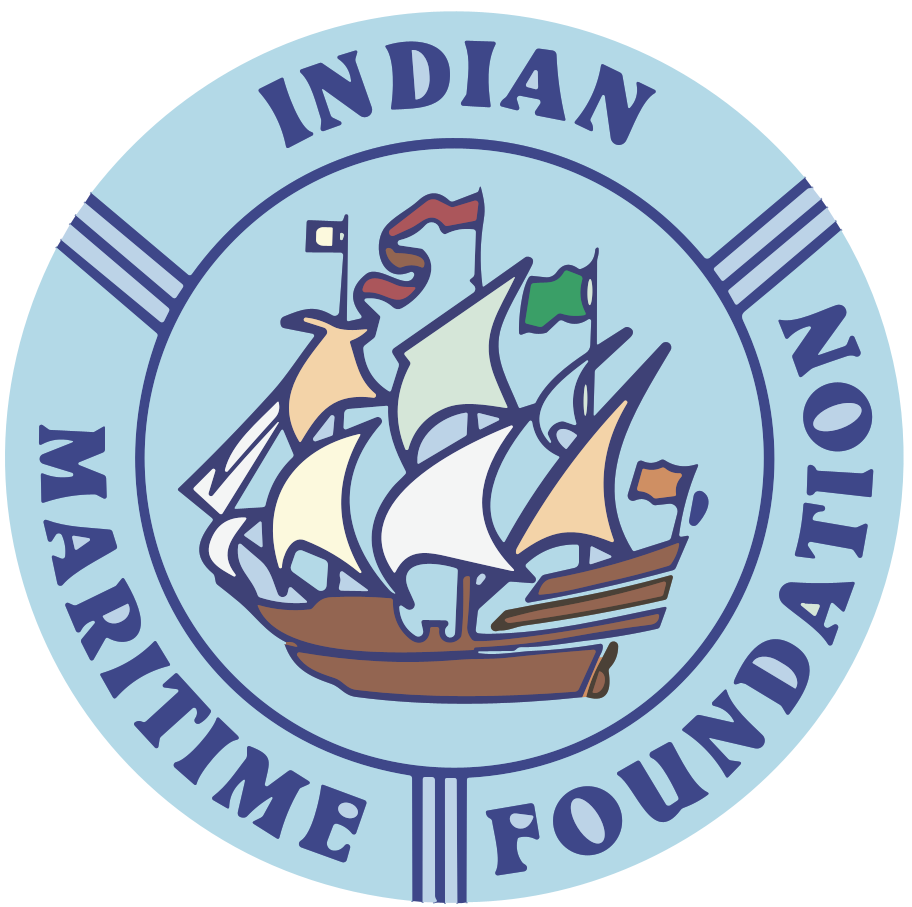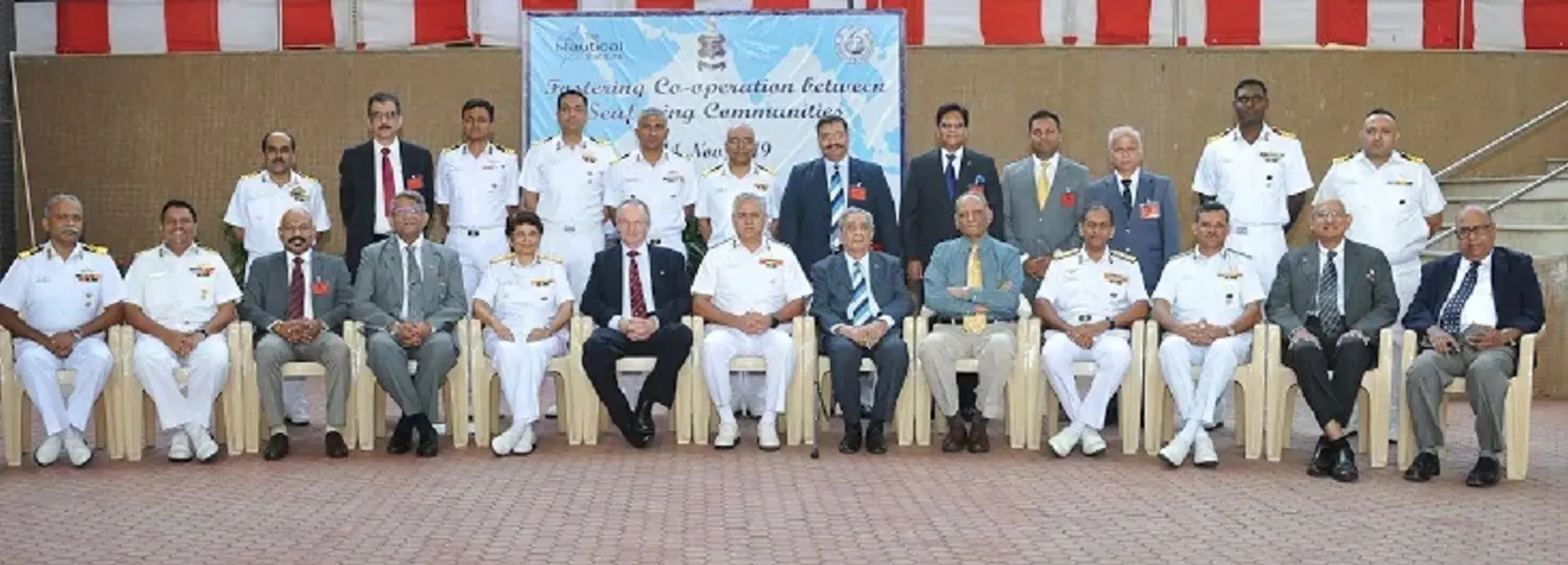
Joint IMF-WNC Seminar 2019
The Sixth Edition of the Joint Indian Navy, Indian Maritime Foundation and Nautical Institute Seminar was held on the 14th of November 2019, at the INHS Asvini Auditorium in Mumbai. The aim of these joint seminars has been to bring the seafaring communities together to understand each others’ roles, capabilities, and challenges, and thereby adopt the best practices of each service – the Indian Navy, Indian Coast Guard and the Merchant Navy. The theme of this year’s seminar was Maritime Safety, and thus the Seminar was aptly titled: ‘Maritime Safety – Problems, Prognosis and Prescriptions’. Vice Admiral RB Pandit AVSM, Chief of Staff Western Naval Command was the Chief Guest, and the seminar was attended by Flag Officers and Senior Officers – both serving and retired of the Indian Navy, Members of the Nautical Institute, Council Members of the IMF, Senior Mariners from the Merchant Navy, Coast Guard Officers and a large number of Junior Officers from the Navy, Coast Guard and Trainees from various Nautical Training Institutes in Mumbai. It was almost a packed house at the magnificent Asvini Auditorium.
- Inaugural Session
- Inaugural Address
- Keynote Address
- Session I : "Safety at Sea"
- Session II : "General Safety"
- Special Address : "Blockchain in Shipping"
- Session III : Panel Discussion on “Marine Safety – Myriad Issues, Multiple Players, and Complex Mosaic"
- Closing Session
- Valedictory Address
- Presentation of Mementos
- Vote of Thanks
Inaugural Session
After a brief welcome address by Cdr Sodha, the Master of Ceremonies, the Podium was handed over to Cmde Ajay Chitnis, Vice President IMF, to deliver the Opening Address, on behalf of the President IMF. In his opening address Cmde Chitnis brought out that this was the only forum in India where Seafarers from different organizations came together for interaction on various aspects of usage of the sea for legitimate purposes as the global commons. He then compared the concept of maritime safety to flight safety, and said that even though mariners had been around from time immemorial, the formalized concept of safety was lagging far behind Flight Safety, even though aviation itself was barely over a century old, thus underlining the importance of this seminar. He then informed the audience about the Indian Maritime Foundation and its activities very briefly, and the role of the founder president – Cmde Rajan Vir, invoking the audience to give an ovation to this living legend. Cmde Chitnis, then introduced Capt Nick Nash, the President of the Nautical Institute, and a Chartered Master Mariner, presently in Command of the Cruise Liner Royal Princess, who had come all the way from London to attend the Seminar, and invited him to deliver the Inaugural Address.
Inaugural Address
Capt Nick Nash delivered the Inaugural Address, and after complimenting the Nautical Institute’s India West Branch, expressed his happiness at being in Mumbai. He gave a brief overview of the activities of the Nautical Institute and how the subject of Marine Safety occupied a high spot in their scheme of things. He also outlined some of the new activities being taken up by NI globally and how the absorption of newer technologies would help in raising the standards of seafaring across the globe.
Keynote Address
Vice Admiral RB Pandit, Chief of Staff, Western Naval Command was the Chief Guest and delivered the Keynote Address. He informed that after a few safety related incidents in the Navy, it had been decided to set up a dedicated Maritime Safety Organization. This would be placed under the Southern Naval Command, which is the Training Command of the Indian Navy, and be headed by the Flag Officer Maritime Safety. He agreed with Cmde Chitnis in as much as the aspect of the Navy lagging behind the Air Force in terms of ‘Safety’, as an organized activity. He exhorted all, especially the younger members of the audience in the front rows, to ingrain safety into their daily activities, be it ashore or afloat, at home or at the work place.
Session I : “Safety at Sea”
The First Technical session was titled “Safety at Sea”, and was moderated by Capt Amol Deshmukh, a veteran seafarer, and an expert on Maritime Law. There were three speakers in this session – Capt Sudip Malik IN, from the Indian Navy Workup Team, Capt Gyanendra Singh AFNI, MD ABACA Research and Consultancy, and Commandant Alex Thomas ICG, from ICGS Samrat. Capt Malik’s presentation was titled “Safety at Sea – Issues, Implications and Initiatives”, and dealt with the practical aspects of how safety procedures were dovetailed into the workup programs of warships. Capt Gyanendra Singh spoke about Navigation Audits. With some real-life examples, he highlighted the need for audits, and common observations across these audits. Comdt Alex Thomas spoke on Coast Guard Perspectives on Sea Safety including Fire and Flooding. The Q and A session was held after all three speakers had finished and elicited some very relevant questions from the audience. Capt Amol Deshmukh summarized the session before bringing it to a close.
This was followed by a Tea Break, during which the Group Photograph was taken, of all the speakers, moderators and dignitaries present.
Session II : “General Safety”
The Second Technical Session, titled “General Safety”, was moderated by Cmde O Johnson, currently the Curator of the Maritime History Society. An erudite speaker himself, Cmde Johnson is one of the few naval officers who qualified as a Second Officer in the Merchant Navy, and thereafter joined the Indian Navy. The speakers in this session wee Capt Ashok Menon, a Master Mariner, Cmde Viresh Das from the recently set up Indian Naval Safety Team, and Capt Sanjiv Sehgal, Master Mariner. Capt Ashok Menon’s presentation was titled “Tackling Cognitive Risks in the Maritime Industry”. His focus was on the fact that across the industry, incidents and accidents were analyzed and in most cases the Root Cause was identified as Human Error; however, the underlying cause of why the human erred is seldom investigated. He advocated the need to delve deeper into the functioning of the human brain as a way to understand how an individual learns, and how this learning is affected by various influences in the deeper realms of the brain. Cmde Viresh Das made a presentation titled “Measures to Improve Safety Culture and Tools for Accident Prevention”. This in fact was an insight of what the newly formed Maritime Safety Organization stands for in the coming years. Capt Sanjiv Sehgal spoke about Risk Management and Controls, an integral element of the Safety management System on board. Cmde Johnson skillfully steered the discussions that followed, bringing to fore some of the major areas that need attention in ensuring safer seas and safer ships.
A sumptuous “Networking Lunch” hosted by Western Naval Command was enjoyed by all present and was a good way to interact with mariners from various walks of life, and renew old acquaintances.
Special Address : “Blockchain in Shipping”
A special address was included immediately after the lunch break by Ms Liji Nowal, the MD of ODeX India Solutions Ltd. Though not directly connected with Maritime Safety, her talk titled “Blockchain in Shipping”, was included in the program as an indicator of how the shipping industry is absorbing cutting edge technology into business. She admitted to not being a seafarer, but an outsider brought in to suggest solutions technologically. To move one container from place A to place B involved over 20 Agencies, as she discovered when she started getting associated with the maritime business. These included the manufacturers, the shippers, Customs, etc., and generated a plethora of paperwork. She and her company were involved in finding ways to streamline these activities using Blockchain Technology. Without getting too technical, she outlined the steps being taken, and was asked a number of questions at the end of her talk.
Session III : Panel Discussion on “Marine Safety – Myriad Issues, Multiple Players, and Complex Mosaic”
The Third Technical session was a Panel Discussion titled “Marine Safety – Myriad Issues, Multiple Players, and Complex Mosaic. The Panelists were Capt Sudip Malik from the Indian Naval Workup Team, Capt Subhal Nathan, Command Maritime Safety Officer from HQ Western Naval Command, Capt Kapil Dev Bahl, Master Mariner and Past President of Nautical Institute India West, and DIG Mehrotra, Chief Staff Officer Operations at HQ Coast Guard Western Region. The discussion was moderated by Cmde Ajay Chitnis, Vice President IMF, who began the proceedings with an observation of how modern technologies, often termed ‘Disruptive’, were in fact going to lead us to safer ships and more safety for seafarers. He opined that shipping is on the brink of a new era with technologies emerging around fuel and energy use, automation and vessel management, materials and construction and so many other areas, would lead to new generations of ships that bring substantial improvements to safety standards. He then introduced the panelists and began the discussions with asking Capt Subhal Nathan about how the recently introduced Safety Organization was functioning and whether any changes in the safety culture were noticeable. All the panelists were asked for their views on measures to improve upon safety standards, and how operations and safety aspects were dovetailed; how commercial pressures impacted safety issues; the role of ‘Trust’ on board ships, especially with multiple nationality crews on board; how the plethora of paper work is handled on board; has the introduction of the maritime safety organization in the Navy resulted in increased paperwork etc. The responses resulted in a lively discussion and were not only restricted to the panelists but were also opened up to the audience, whose active participation resulted in an extremely interesting session.
Closing Session
The closing session began with a summing up of the day’s proceedings by Cmde Srikant Kesnur, Director of the Maritime Warfare Centre, and the Chief Organizer of the Seminar. He brought to fore the various aspects highlighted by the speakers and commented on the discussions that followed.
Valedictory Address
The Valedictory Address was delivered by RAdm G Srinivasan, Admiral Superintendent, Naval Dockyard Mumbai. He highlighted the need to improve the safety culture amongst not only naval personnel but also the Dockyard workers, both at work as well as at home.
Presentation of Mementos
Mementos were presented to all the speakers and panelists, and moderators. A special Memento was presented to Cmde Rajan Vir, President of IMF, as he was recognized as the driving force behind these joint seminars, right from their introduction in 2011.
Vote of Thanks
The vote of thanks was proposed by Capt Srikant Limaye, the Secretary of Nautical Institute West, and he presented mementos to Cmde Srikant Kesnur and Cdr Shrawan Kapila of the Maritime Warfare Centre, in recognition of their untiring efforts in organizing the seminar.
That brought the curtain down on yet another major endeavour of the IMF during the past quarter.
